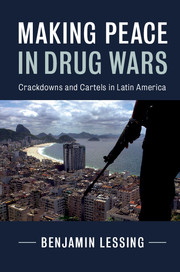Book contents
- Frontmatter
- Dedication
- Contents
- Figures
- Tables
- Preface
- Acknowledgments
- Abbreviations and Acronyms
- 1 Introduction
- PART I A THEORY OF CARTEL–STATE CONFLICT
- PART II CASE STUDIES
- 5 Colombia: Conditionality to Contain a Killer
- 6 Rio de Janeiro: Conditionality, One Favela at a Time
- 7 Mexico: Conditionality Abandoned
- PART III CONDITIONAL REPRESSION AS OUTCOME
- Appendix A Violent-Event Data
- Appendix B List of Interview Subjects
- Bibliography
- Index
- Miscellaneous Endmatter
5 - Colombia: Conditionality to Contain a Killer
from PART II - CASE STUDIES
Published online by Cambridge University Press: 17 November 2017
- Frontmatter
- Dedication
- Contents
- Figures
- Tables
- Preface
- Acknowledgments
- Abbreviations and Acronyms
- 1 Introduction
- PART I A THEORY OF CARTEL–STATE CONFLICT
- PART II CASE STUDIES
- 5 Colombia: Conditionality to Contain a Killer
- 6 Rio de Janeiro: Conditionality, One Favela at a Time
- 7 Mexico: Conditionality Abandoned
- PART III CONDITIONAL REPRESSION AS OUTCOME
- Appendix A Violent-Event Data
- Appendix B List of Interview Subjects
- Bibliography
- Index
- Miscellaneous Endmatter
Summary
The war between the Colombian state and Pablo Escobar's Medellín cartel is perhaps the most well-known example of cartel–state conflict on record; this chapter marshals the theory developed in Part I to explain its dynamics. I make the following claims: (1) Colombia's initial crackdown and escalation (1983–1986) were unconditional. This led cartels—united under Medellín's leadership—to adopt increasingly violent strategies toward the state. (2) From 1987 onward, repression increasingly focused on Medellín to the exclusion of Cali because the former engaged in anti-state violence; that is, conditionality across cartels increased. This contributed to Cali's decision to attack Medellín (1988), and permitted it to operate in concert if not cooperation with the state to destroy Escobar (1992–1993). (3) The Sometimiento policy (1990–1991) allowed the state to credibly promise reduced repression on Medellín if it eschewed violence going forward, raising conditionality within cartels. Medellín members responded by eschewing anti-state violence. (4) The rescinding of Sometimiento after Escobar's escape (1992–1993) decreased conditionality within cartels, leading Escobar to re-engage in anti-state violence. I also conjecture that after the fall of Medellín and Cali, an effectively conditional approach has deterred cartel–state conflict. I describe the policy reform process that produced Sometimiento and the failed attempts at reform that preceded it, and discuss the unique role of violent lobbying in Colombia.
OVERVIEW
In a country wracked by waves of mass violence and civil war, from the nineteenth century to the present day, the narco-guerra between Colombia's state and its drug cartels—dating roughly from Pablo Escobar's murder of Justice Minister Rodrigo Lara Bonilla in April 1984 to Escobar's death at the hands of state forces in December 1993—still stands out. Ask most Colombians who were alive at the time, and they will vividly recall the day of Escobar's death. Fernando Botero, Colombia's greatest living artist, mythologized that moment in two iconic paintings. And though non-specialists were often unfamiliar with the details of the period when I first visited Colombia in 2007, everyone became an expert after watching the immensely popular 2012 mini-series El Patrón del Mal, based on Salazar's (2001) definitive history.
- Type
- Chapter
- Information
- Making Peace in Drug WarsCrackdowns and Cartels in Latin America, pp. 121 - 157Publisher: Cambridge University PressPrint publication year: 2017



